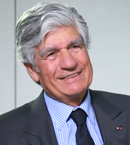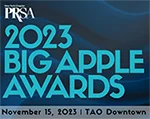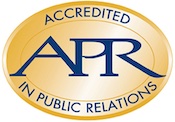Publicis CEO Maurice Levy, fresh from a humiliating tangle with Omnicom, should tell employee Mark McClennan to quit as treasurer of PRSA, a further blot on the Publicis escutcheon.
 |
This blog is an open letter to Levy. Publicis came across as a naïve country bumpkin in being led down the garden path by Omnicom, which was almost successful in convincing Levy that OMC’s acquisition of Publicis was really a merger.
"OMC wanted their people to fill the CEO, CFO and general counsel jobs," a crestfallen Levy told Reuters.
OMC is twice as big as Publicis in terms of revenues so how could this ever be a merger? The golden goose sought by both was “scale,” meaning the ability to squeeze already distressed media even further by combined buying might. Three big ad agencies would control almost all such purchases.
The pay packages of OMC CEO John Wren and CFO Randy Weisenburger were multiples greater than anything Levy got. Wren’s package was $71.4 million in 2012-13 while Weisenburger got $43.4M in those two years. This is far above the $14M in annual pay enjoyed by CEOs at the 200 biggest U.S. companies.
PR Society Is Bad Company for Publicis
Publicis should not be in bed with the PR Society, which it is in the form of McClennan, SVP of MSLGroup/Publicis, Waltham, Mass., who as treasurer of PRSA is a likely candidate for chair.
The Society’s history includes being in violation of anti-trust laws from 1953 to 1977 when the FTC forced revision of its “Ethical” Code; illegal copying and sale of authors’ works without their permission from 1978-94; ditching its enforceable Code in 1999 when the board itself was hit with charges of five violations; illegally and unethically barring O’Dwyer reporters from annual conferences starting in 2010, and ongoing refusal to deal with the press, PR’s No. 1 role.
McClennan proved the last point by refusing to give us a link to the 2013 audit of the Society when it was published Monday on its website and refusing to answer our questions about it when we obtained it from members.
 |
Reporters cannot cover the Society without having access to its annual and quarterly financial reports. But that is the tack that McClennan and the Society take.
Publicis, a public company that toes the strictest line in financial reporting, should not be within ten miles of an organization that does not.
PRSA Reports Financially—Not Ethically
PRSA's financial report for 2013 has one stunning statistic—an all time low of $1,057 was spent on “Ethics,” besting the old record of $1,406 spent in 2011.
The 16-page audit shows that revenues rose to $11,405,304 from $11,083,420. That is no great shakes because it is still below 2006 revenues of $11,426,867.
McClennan posted a rosy statement on the Society website noting that operating revenues exceeded expenses by $310,000 when an insurance payment and investment income are not counted.
If they are counted, surplus is $812,382, which raised unrestricted net assets to $4,966,333 from $4,153,951.
Last year was a good year in the stock market where the Society’s common stocks rose $374,852 (27%) to $1,764,576 from $1,389,723. Certificates of deposit, bonds and preferred stock and common stock totaled $4,605,796 as of Dec. 31, 2013.
How About Spending Some of It?
The PR Society is not quite as rich as the Committee to Protect Journalists, which had $14.9 million in stocks and cash according to its latest report, but it does have a lot more swag than many groups.
Society staffers are well paid, sharing a total of $5,534,037 in payroll costs or an average of $100,000 for the 55 or so staffers. This is far more than most PR people make. Even if the top six staffers are removed, average pay is around $80K.
McClennan is happy with the Society’s financial results. He says it “increased its membership base to 21,651.” However, this is down from a 22,000 figure that had been quoted by 2013 chair Mickey Nall.
It’s also only 1,385 more than the 20,266 total reached 14 years ago in 2000. About 100 members are being added yearly—no great shakes during a period in which there were ups as well as downs in the economy.
Ethics Spend Almost Non-Existent
The Society’s Code of Ethics says “Ethical practice is the most important obligation of a PRSA member.” The first page of the Code mentions “ethics” or “ethical” no less than 12 times.
But here’s what’s been spent on ethics: $1,057 in 2013; $5,290 in 2012; $1,406 in 2011; $2,649 in 2010, and $2,891 in 2009.
“Code enforcement” had cost $230,506 from 1988-93, an average of $38,417 yearly. It dipped to $15,565 in 1994, when Ray Gaulke arrived as COO; disappeared entirely in 1995; totaled $3,846 in 1996 and $1,557 in 1997.
Then things began to heat up. Spending went to $24,985 in 1998. “Enforcement” cost $14,341 in 1999 and “Code Revision,” $93,229. Revision cost $104,108 in 2000 and $11,695 in 2001 for a total of $208,942 on revision.
What did this expensive revision do? It basically took out all enforcement provisions including judicial panels but added that members had to reveal clients they were working for if asked. The old Code did not do that. Members only had to be “prepared” to reveal sources of information.
If you ask us, the Code could have been re-written in one afternoon by a competent PR practitioner.
Return to Enforceable Code Needed
What’s needed is a return to an enforceable Code, something that was desired by a majority of members responding to polls of the Ethics Resource Center in 2001. ERC itself recommended an enforceable Code.
The Society should appoint a new ethics task force comprised of only 18% APRs which would represent the portion of APRs in the membership. The current Ethics Board is 100% APRs which makes it unrepresentative of the membership.
First order of business would be removing all restraints on press coverage of Society meetings and teleconferences. Reporters would be able to join, giving them access to quarterly and annual financial reports. Control of the Society should be put in the hands of the Assembly, something that is mandated by Robert’s Rules, which the Society professes to follow. Use of proxies in the Assembly, a violation of everything that Robert’s stands for, should halt.
These are only a few of the reforms needed. The APRs are not going to give up their stranglehold on the Society unless key figures quit. CEO Bill Murray did that on March 7, supplying only one sentence for this momentous decision: “After deep reflection, I’ve decided that the time has come for me to leave PRSA and pursue new opportunities and new challenges.”
That is no explanation at all. We think he got disgusted with Society policies and practices. Others should do the same starting with McClennan. It is up to Levy to order this. We hope he sees the light. The only thing in store for Levy and Publicis is further embarrassment if he is allowed to stay.


 PRSA-NY today announced its five honorary co-chairs for its Big Apple Awards ceremony gala slated for TAO Downtown on Nov. 15.
PRSA-NY today announced its five honorary co-chairs for its Big Apple Awards ceremony gala slated for TAO Downtown on Nov. 15. PRSA-NY president Carmella Glover today issued a "heartfelt apology" on behalf of the chapter for her Oct. 14 message that "caused disappointment and hurt to some of our valued members."
PRSA-NY president Carmella Glover today issued a "heartfelt apology" on behalf of the chapter for her Oct. 14 message that "caused disappointment and hurt to some of our valued members." The leadership of Public Relations Society of America is backing a move to change the current “must-have” APR accreditation to “strongly preferred” as a requirement for a seat on its board of directors.
The leadership of Public Relations Society of America is backing a move to change the current “must-have” APR accreditation to “strongly preferred” as a requirement for a seat on its board of directors. Public Relations Society of American today named Linda Thomas Brooks CEO, succeeding CFO Phil Bonaventura, interim chief since July 2019.
Public Relations Society of American today named Linda Thomas Brooks CEO, succeeding CFO Phil Bonaventura, interim chief since July 2019.


 Have a comment? Send it to
Have a comment? Send it to 
No comments have been submitted for this story yet.